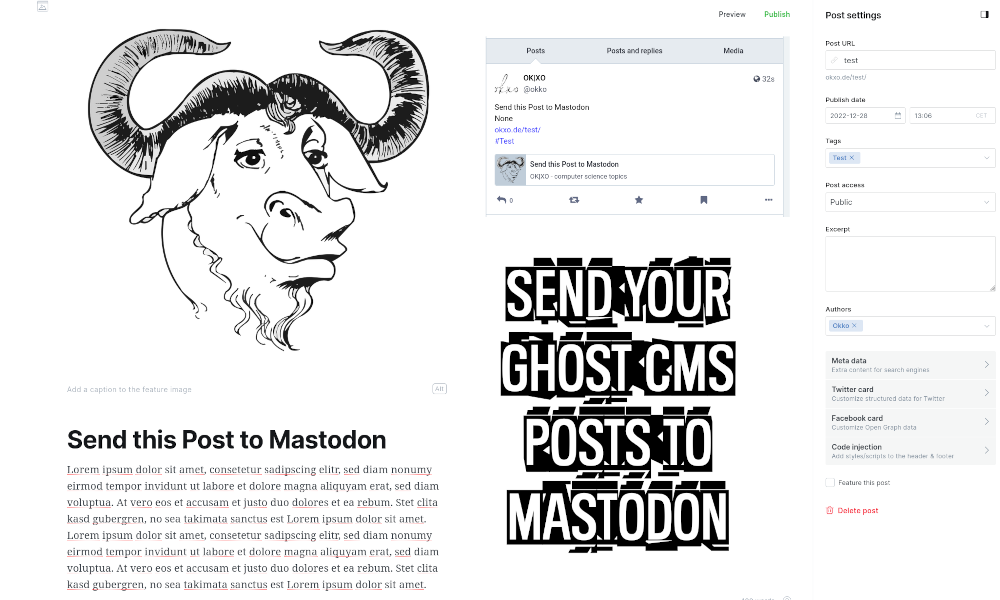https://github.com/sowoi/ghostcms2mastodon
Send posts from GhostCMS to Mastodon.
https://github.com/sowoi/ghostcms2mastodon
docker docker-compose flask ghost ghost-cms mastodon python webhook-server
Last synced: 11 months ago
JSON representation
Send posts from GhostCMS to Mastodon.
- Host: GitHub
- URL: https://github.com/sowoi/ghostcms2mastodon
- Owner: sowoi
- License: gpl-3.0
- Created: 2022-11-22T07:58:11.000Z (over 3 years ago)
- Default Branch: main
- Last Pushed: 2023-12-04T20:09:27.000Z (about 2 years ago)
- Last Synced: 2025-04-02T04:37:28.597Z (11 months ago)
- Topics: docker, docker-compose, flask, ghost, ghost-cms, mastodon, python, webhook-server
- Language: Python
- Homepage: https://okxo.de/send-your-ghostcms-posts-to-mastodon/
- Size: 290 KB
- Stars: 4
- Watchers: 1
- Forks: 1
- Open Issues: 6
-
Metadata Files:
- Readme: README.md
- License: LICENSE
Awesome Lists containing this project
README
# ghostcms2mastodon
Send posts from GhostCMS to Mastodon.

# General design
Ghost CMS triggers new posts and sends a webhook with the new post to a local Python Flask instance.\
The Flask script fetches the relevant data from the payload and creates a Mastodon post.\
We use Mastodon.py for this.\
The Flask script is secured by UWSGI and access control.\
As a bonus, GhostCMS tags are converted to Mastodon hashtags.
# Features
- Once set up completely automated
- Restricting access to trusted IPs
- Encrypted transmission to Mastodon
- Respecting Mastodon policies (no excessive ping queries, avoiding SPAM, etc.)
- Extensive debugging
# Remote use / security
By default, the webhook endpoint should not be accessible from outside. \
Access to the webhook is unencrypted, because GhostCMS does not allow access (without major intervention) to self-signed certificates. \
If you are not running the instance on the same server as Ghost CMS, you need to encrypt the connection via https (e.g. using a reverse proxy). \
Your GhostCMS must then be added to the trusted proxies list in .env
# Prequistes
- Mastodon access token
- Custom integrations webhook in Ghost CMS
- You need to add secrets to .secure folder or pass the secrets via docker run
# Mastodon access token
The only check you need to set is at "write:statuses".\
Leave all others unchecked! \
This container does not use any other settings and therefore does not need any other permissions!
# Webhook endpoint
http://**dockerIP**:5000/webhook
You can of course change this port via Docker or in the source code. \
If you are using the docker compose setting with fixed ip, that would be the IP 10.9.9.99 \
On bare metal installations it would be localhost/127.0.0.1.
# Ghost CMS
The settings in Ghost CMS are done via custom integrations.\
The event trigger is "Post published
# Create secrets
Secrets are parsed to the folder .secrets in your docker folder:
```
.
├── docker-compose.yml
├── .secrets
│ ├── MASTODON_ACCESS_TOKEN
│ ├── MASTODON_BASE_URL
│ ├── TRUSTED_PROXIES
│ └── WEBHOOK_SECRET
```
Populate the files in the .secrets directory as follows:\
Copy your Mastodon token to MASTODON_ACCESS_TOKEN.\
Copy your Webhook token from Ghost CMS to WEBHOOK_SECRET.\
Enter in MASTODON_BASE_URL the address of your Mastodon instance, e.g. https://mastodon.social .\
At TRUSTED_PROXIES you enter a list of IPs that should have access to your webhook instance.
By default, only localhost and access via Docker subnet from the Docker compose example is entered with a fixed IP, i.e. 10.9.9.0/24.\
# Docker
```
docker run -d -p 5000:5000/tcp \
-v "${PWD}/.secrets/WEBHOOK_SECRET:/run/secrets/WEBHOOK_SECRET:ro" \
-v "${PWD}/.secrets/MASTODON_ACCESS_TOKEN:/run/secrets/MASTODON_ACCESS_TOKEN:ro" \
-v "${PWD}/.secrets/MASTODON_BASE_URL:/run/secrets/MASTODON_BASE_URL:ro" \
-v "${PWD}/.secrets/TRUSTED_PROXIES:/run/secrets/TRUSTED_PROXIES:ro" \
--net webhookSubnet \
--ip 10.9.9.99 okxo/ghostcms2mastodon
```
# Docker compose
```
version: '3.1'
secrets:
WEBHOOK_SECRET:
file: ${PWD}/.secrets/WEBHOOK_SECRET
MASTODON_ACCESS_TOKEN:
file: ${PWD}/.secrets/MASTODON_ACCESS_TOKEN
MASTODON_BASE_URL:
file: ${PWD}/.secrets/MASTODON_BASE_URL
TRUSTED_PROXIES:
file: ${PWD}/.secrets/TRUSTED_PROXIES
services:
ghostcms2mastodon:
image: okxo/ghostcms2mastodon:latest
restart: always
ports:
- 127.0.0.1:5000:5000
secrets: [WEBHOOK_SECRET,MASTODON_ACCESS_TOKEN,MASTODON_BASE_URL,TRUSTED_PROXIES]
environment:
WEBHOOK_SECRET: /run/secrets/WEBHOOK_SECRET
MASTODON_ACCESS_TOKEN: /run/secrets/MASTODON_ACCESS_TOKEN
MASTODON_BASE_URL: /run/secrets/MASTODON_BASE_URL
TRUSTED_PROXIES: /run/secrets/TRUSTED_PROXIES
networks:
vpcbr:
ipv4_address: 10.9.9.99
tty: true
networks:
vpcbr:
driver: bridge
ipam:
config:
- subnet: 10.9.9.0/24
gateway: 10.9.9.1
```
You need to enter a fixed ip for the docker container. \
docker compose up -d
# NGINX reverse proxy
Create an upstream in /etc/nginx/nginx.conf
```
upstream mastodonwebhook {
server 127.0.0.1:5000;
keepalive 64;
}
```
Add webhook location to your GhostCMS NGINX conf (in sites-availabe or in conf.d folder):
```
location /webhook {
proxy_set_header Host $host;
proxy_set_header X-Real-IP $remote_addr;
proxy_set_header X-Forwarded-For $proxy_add_x_forwarded_for;
proxy_set_header X-Forwarded-Proto $scheme;
proxy_set_header X-Forwarded-Host $http_host;
proxy_set_header X-Forwarded-Uri $request_uri;
proxy_set_header X-Forwarded-Ssl on;
proxy_redirect http:// $scheme://;
proxy_http_version 1.1;
proxy_set_header Connection "";
proxy_cache_bypass $cookie_session;
proxy_no_cache $cookie_session;
proxy_buffers 64 256k;
# If behind reverse proxy, forwards the correct IP
set_real_ip_from 10.0.0.0/8;
set_real_ip_from 172.0.0.0/8;
set_real_ip_from 10.9.0.0/16;
set_real_ip_from 192.168.0.0/16;
set_real_ip_from fc00::/7;
real_ip_header X-Forwarded-For;
real_ip_recursive on;
proxy_pass http://mastodonwebhook;
}
```
Restart Nginx.
# Poetry
Dependencies are in pyproject.toml
# Bare metal
```
apt install python3-dev python3-venv \
pip3 install -r requirements \
python3 -m venv webhook && source webhook/bin/activate \
cd webhook \
cp Pythonfiles and ini files to your webhook folder \
export MASTODON_ACCESS_TOKEN='**Add_your_Access_Token_Here**' \
export MASTODON_BASE_URL='**https://Add_your_Mastodon_URL_Here**' \
export TRUSTED_PROXIES='**LIST of IPs with access to local webhook endpoint**'\
```
start uwsgi server:
```
uwsgi --socket 127.0.0.1:5000 --protocol=http -w wsgi:app
```
# Acknowledgements
This project uses https://github.com/halcy/Mastodon.py and would not be feasible without this advance work.
# License
Licensed under the terms of GNU General Public License v3.0. See LICENSE file.
# Dev
https://okxo.de